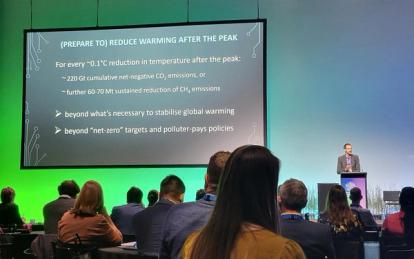
Ambition Meets Accountability: Key Takeaways from the 2025 Climate Change & Business Conference
- Post Date
- 15 September 2025
- Read Time
- 4 minutes

Last week, leaders from government, business, academia, and civil society gathered in Auckland for the Climate Change & Business Conference 2025 - a focused event driving practical conversations on climate action. With over 30 sessions covering topics from international law and finance to nature markets and emissions trading, the conference offered a clear view of how Aotearoa New Zealand and its partners are navigating the global climate transition.
Below is SLR’s summary of the top insights from each day:
Day 1 - Monday, 8 September
1. Pacific Leadership and Legal Accountability
The conference opened with a powerful message from Pacific leaders, including Hon. Ralph Regenvanu of Vanuatu and Cynthia Houniuhi of Pacific Islands Students Fighting Climate Change, who championed the successful campaign for an International Court of Justice (ICJ) advisory opinion on states’ climate change obligations[1]. This initiative reframes climate change as a legal and human rights issue, setting a precedent for international accountability. It also highlighted the Pacific’s disproportionate vulnerability and moral authority in global climate negotiations.
2. Climate Change is an Economic and Trade Issue
As an exporting nation, New Zealand’s prosperity is closely tied to international cooperation and market access. Discussions highlighted how climate policy is increasingly influencing trade dynamics, with mechanisms like the Carbon Border Adjustment Mechanism (CBAM) shaping the rules of global commerce. There was energetic debate among political leaders about how best to meet New Zealand’s climate goals, but a clear consensus emerged: the goals must be met. The urgency of aligning domestic policy with international expectations was a recurring theme.
3. Overshoot of Paris is Imminent - Preparing for Significant Reductions and Adaptation Must Accelerate
Climate scientist Andy Reisinger presented research[2] showing that limiting warming to 1.5°C is unlikely to be feasible. In the most ambitious scenario, the world is expected to overshoot - defined by the IPCC as exceeding and then declining - to at least 1.7°C and ideally settle closer to 1.5°C by 2100. Importantly, limiting warming to this level requires the same scale of emissions reductions that were needed to limit warming to 1.5°C back in 2018. This underscores the need for urgent and ambitious action, not only in emissions reduction but also in adaptation planning, infrastructure resilience, and community preparedness, even when the targets are difficult.

Day 2 - Tuesday, 9 September
1. Finance is a Catalyst for Climate Action
A keynote from Lord Adair Turner presented compelling research from the UK’s Energy Transition Commission suggesting that the energy transition could happen faster than many expect, but only if finance is mobilised at scale. He highlighted the need for capital to flow into clean technologies, infrastructure, and emissions budgeting to accelerate the shift. Complementing this, Dr. Rod Carr, Chair of the Climate Change Commission, challenged attendees to ask who benefits from delay, urging business leaders to confront inertia and vested interests that slow progress. The message was clear: finance is not just a tool - it’s a lever for transformation.
2. Nature is Moving to the Forefront, with Ongoing Debate for the Future of Land Use
A strong theme throughout was the growing importance of nature-based solutions and the evolving role of carbon and nature markets. Sessions on voluntary credits ran alongside discussions on updates to the Emissions Trading Scheme (ETS), highlighting how these mechanisms are reshaping land use decisions. In particular, the ETS has had significant implications for forestry, with many landowners planting trees for carbon credits rather than timber, and important questions on whether this is achieving either emissions reduction goals or economic ones. Meanwhile, methane from agriculture remains excluded, raising questions about the effectiveness of emissions pricing. The convergence of these conversations signals a shift toward more integrated, nature-positive climate strategies - but also underscores the complexity of aligning incentives across sectors.
Final Reflection
Across both days, the conference reinforced that climate action is no longer optional but a strategic imperative - legally, economically, and operationally. This is where ambition meets accountability: businesses must not only set bold climate goals but also take responsibility for delivering real impact. To succeed in a rapidly changing world, they need to lead with integrity, foster collaboration across sectors, and embrace innovation. Only by aligning purpose with action can business thrive in a climate-conscious future.
-----
References
[1] https://www.icj-cij.org/sites/default/files/case-related/187/187-20250723-pre-01-00-en.pdf
[2] https://www.annualreviews.org/content/journals/10.1146/annurev-environ-111523-102029
Recent posts
-

-

-

Part one: Comminution, flotation and sample preparation at SLR’s mineral processing laboratory
by Ben Simpson
View post